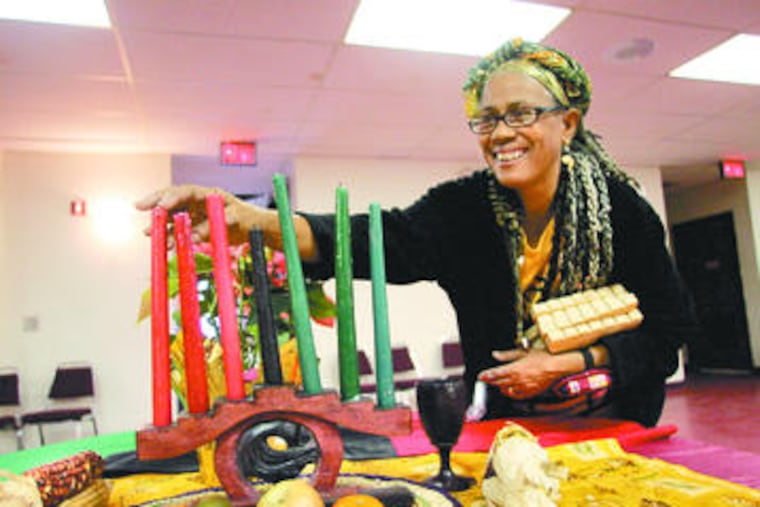Lawnside Kwanzaa celebration focuses on heritage, family
The organizers of the Kwanzaa festival in the historically African American hamlet of Lawnside can always count on the Martins of Sicklerville, the "first family of Kwanzaa."

The organizers of the Kwanzaa festival in the historically African American hamlet of Lawnside can always count on the Martins of Sicklerville, the "first family of Kwanzaa."
For each of the last 15 years, John and Lauwana Martin - along with their four children and a rotating cast of friends - spend Dec. 26, the first day of Kwanzaa, in Lawnside, which was a stop on the Underground Railroad.
"It's so easy to buy into the other celebrations because that's what the market pushes," said John Martin, 46, whose family does not celebrate Christmas. "This is a simple cultural celebration - food, people, not a lot of commerce."
In place of Christmas, the Martins have found family tradition and cultural connection in Kwanzaa. They open gifts after a big Kwanzaa feast on Jan. 1, the celebration's seventh and final day, and on the first day they come to the Wayne R. Bryant Community Center to see old friends, watch performances and create crafts for the Kwanzaa table at their house.
It is their African heritage, not religion, that forms the basis of their identify.
"It's just home," John Martin said. "Coming here is just home."
For the youngest Martin, Rayana, 14, the Kwanzaa festival allows her to "celebrate the African culture, and freedom from slavery."
For Tamara, 21, Kwanzaa is about connecting generation to generation.
"Some people have wisdom that's passed down that you can't learn in books, so this is a good place to get that," she said.
Minutes after she spoke, a 6-year-old boy holding a green balloon stared in wonder as Marvin Pollitt, 58, of Lawnside, banged out an African beat with his bare hands on three drums.
For a moment, Pollitt was passing down the lessons that Tamara Martin spoke about.
Pollitt said the African beat is "in the bloodline."
"You're a young guy," he told the boy, Dlayne Peterson. "Build your hands up, build your arms up, and you'll be dangerous!"
Kwanzaa is rooted in traditional African harvest celebrations, but it was created in America in 1966 as a means of thanksgiving, unity and renewal for African Americans.
There is a free-form feel to the celebration in Lawnside. There are no scheduled activities; when performers show up, they perform. People watch, or join in.
Admission is free, and the Kwanzaa feast is made with food bought with donated funds. Some food is a surprise - whatever cans of vegetables that attendees bring along get cooked.
African music played, a poet performed, dancers romped around and in the corner of the room, children and adults worked together making African-style masks and wooden necklaces. A few vendors sold African-style wares.
"You get together, you talk, you decorate stuff that means something," said Mia Petty of Lawnside, as she painted a mask. "We consider each other family, because we come together as one."